A PIL has recently been filed in the Supreme Court challenging the procedure for declaration and recognition of religious minorities in India.
Minorities in India are determined on a national level. The PIL argues that minorities should be recognized on the state level. Hindus, who are in a numerical minority in 9 states including Ladakh, should be granted minority status in those states, as per the plea.
Section 2(f) of the National Commission for Minority Educational Institutions 2005 (NCMEI) and section 2(c) of the National Commission for Minorities Act (NCM)1992, give the Central government the power to declare a community as a minority.
The central government determines minorities on a national level; therefore, Hindus are considered a majority everywhere, even in states where they are a numerical minority, and Muslims, Christians, Sikhs, Buddhists, Jains, and Parsis are notified as minorities all over the country.
Minority rights are enshrined in Article 29 and Article 30 of the Indian Constitution, which safeguard the rights of minorities to own and manage religious and educational institutions.
After a daunting partition experience, India was faced with the unique challenge of establishing peace. Article 30 was created to provide safeguard to those who stayed in India after the partition. The Constitution makers intended to make minorities feel safe and heard in the country they chose. It has been seven decades now, and the intent of the Article is fulfilled. Article 30 has become as obsolete as Article 370.
This has created more problems that it is solving currently. Hindus do not enjoy the minority privileges, thus lack equal opportunities for growth and development. Hindus already do not have equal opportunities to own and operate their religious institutions in majority states under the HRCE Act 1951.
This arrangement further limits them in establishment and administration rights of educational institutions of their choice, even in states where they are a numerical minority. It had led to political, social, and economic deprivation of Hindus.
The classification of religious minorities by the Center at pan India level has not only created a wave of inequality across different States but also encouraged those who did not belong to that minority religion, to convert themselves for the social, political and economic benefits, the PIL said.
The PIL thus argues that section 2(f) of the NCMEI Act, 2004 and section 2(c) of the NCM Act 1992, be declared arbitrary, irrational, void, and unconstitutional. Religious minorities should instead be declared state-wise so that all minorities can get equal protection before the law.
Karnataka High Court, in TMA Pai Vs the State of Karnataka, maintained the argument behind notifying minorities on a state level. The Eleven-member bench headed by Justice Kirpal said,
"Linguistic and religious minorities are covered by the expression 'minority' under Article 30 of the Constitution. Since reorganization of the States has been on linguistic lines, therefore, for the purpose of determining the minority, the unit will be State and not whole India.
The Constitution framers accepted common citizenship regardless of faith, culture, religion, language, and engrafted Articles 25-30 to give security to all and not appeasement to some.
Declaring minorities pan India undermines the intent of the framers of our constitution by limiting the security and privileges to only some communities. To ensure equal protection before the law to all communities, minorities should be determined on a state basis and their rights conferred accordingly.








